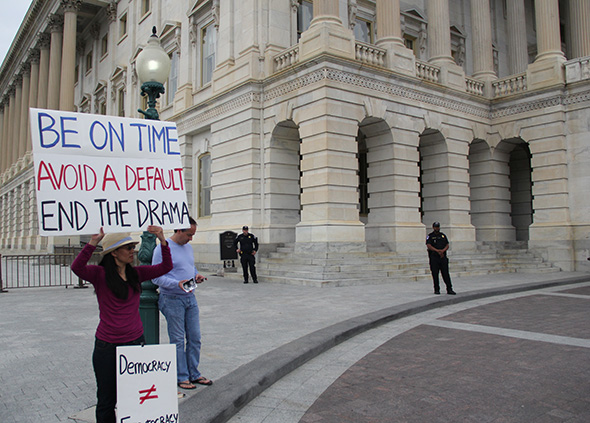
A protester outside the Capitol demands Congress act quickly 12 hours before the United States hits its debt ceiling deadline. Bryan Lowry/MEDILL
WASHINGTON – As the debt ceiling clock ticked, news of a compromise solution to both increase the debt ceiling and end a 16-day partial government shutdown broke midday on Wednesday. But House Republicans were in no rush to say yes to a deal.
Outside the Capitol a small group of protesters gathered with the goal of shaming Congress into acting swiftly. One sign read: “Screw this up & and history will judge.”
The government has been partially shut down, furloughing hundreds of thousands of workers, since Oct 1, when the fiscal 2014 budget was to kick in – but it hadn’t been approved as Republicans attempted to attach defunding of the health care law to it. Meanwhile, the Obama administration has said the debt ceiling will be exceeded on Thursday, causing the government to be unable to pay its bills and loans.
In the Senate, bipartisanship surfaced, at least for the time being.
Senate Majority Leader Harry Reid, D-Nev., and Senate Minority Leader, R-Ky., announced a compromise proposal to raise the debt ceiling until February and to fund the government into mid-January by passing a continuing resolution.
However, Sen. Ted Cruz, R-Texas, lamented the decision of Senate Republicans to compromise. He rejected the suggestion that the shutdown and debt ceiling debate had been a waste.
“We saw the House of Representatives take a courageous stand, listening to the American people,” Cruz said.
On the floor of the House of Representatives the debate continued largely unchanged, with each party blasting the other for failing to negotiate.
Rep. Paul Broun, R-Ga., argued that Congress must stand up to President Barack Obama against government spending. He said his colleagues should have “the courage to oppose any deal that does not defund Obamacare.”
Rep. Joe Wilson, R-S.C., called the roll out of the Affordable Care Act a failure.
Rep. Ted Deutch, D-Fla., accused Republicans of playing a reckless game with the economy. “When you spin the GOP wheel of misfortune everyone loses,” he said.
Deutch listed the calamities default would pose for the economy both here and abroad. “How could ruining the U.S. Treasury Bond, which stands as the world’s safest asset, be good for the economy?”
Rep. Marcy Kaptur, D-Ohio, followed suit. She called on Republicans to support the bipartisan Senate plan, arguing the world depends on the U.S. dollar.
If Republicans would not vote for the plan, Kaptur asked them to at least not stand in its way.
“Our citizens expect a nation that is confident and steady,” Kaptur said. “The least any member can do is to do no harm.”
A field trip of school children watched from the gallery above. Did they realize they were watching history? Most looked bored.
If the more conservative GOP members do not get on board with the bill, House Speaker John Boehner may need to rely on Democratic votes to get House passage of the Senate bill.
The exact timetable for passing a bill is uncertain. The Senate is expected to vote first, most likely on Wednesday evening, according to a House aide.
How much Republican support the bill will find in the House is also questionable. However, the fact that it is expected to receive enough Democratic support to pass is a tremendously positive development, said Harry Stein, associate director of fiscal policy for the Center for American Progress.
Stein, who served as an aide to former Sen. Herb Cole, D-Wis., compared failing to raise the debt limit to refusing to pay your credit card bill.
“The bizarre thing with fighting over the debt limit, all of this brinksmanship, is if we do have a default that would mean we have a bigger debt going forward,” Stein said. “Even if all you care about is debt, this is a bad idea.”
